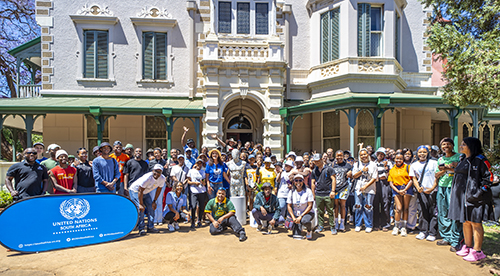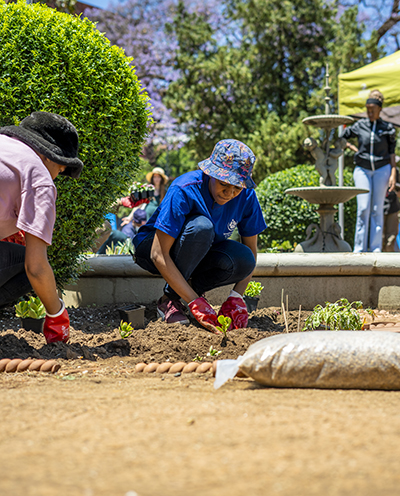Students from the Tshwane University of Technology’s Department of Environmental, Water and Earth Sciences, under the guidance of Dr Catherine Dzerefos, contributed their time and expertise to commemorate United Nations (UN) Day 2024. The event, held annually on 24 October, commemorates the UN's founding in 1945 when the UN Charter came into effect.

This day highlights the UN's unique role in fostering global unity, advocating for peace and inspiring hope for a better future while urging nations to work together toward common goals. In keeping with this theme, the students joined in community-driven restoration projects at the historic Melrose House Museum and Burgers Park, where they applied their knowledge of environmental management and sustainability.
Melrose House, a mansion built in 1886 and now a South African National Monument, served as the backdrop for the creation of a Victorian succulent garden designed to align with the city’s drive to save water. While some students participated in gardening, a second group sanded and painted climbing equipment in the children’s play area at Burgers Park. A third group traversed the park cleaning up and interacting with the community. A lively game of traditional children’s games played in a circle amidst singing and laughter was the highlight for this group. The event was made possible by the strong partnership developed with The Wildlife and Environment Society of South Africa (WESSA) and Mosaic Art by Natania Botha & Studio. The students worked alongside youth from the Downs Syndrome Association of Pretoria, German volunteers based at the Tshwane Leadership Foundation and the Manhattan Hotel that kindly provided the food and theology students from the University of Pretoria.

These efforts, said Dr Dzerefos, highlight the importance of protecting our cultural heritage and parks: "When students engage in projects like these, they realise the responsibility that comes with a tertiary education and that they can actively contribute to promote tourism, community well-being and climate change resilience through preserving public spaces."
Action projects breakdown negative mindsets and foster a sense of pride in the city as well as in the self. They link directly to the UN’s 17 sustainable development goals notably Goal 11 for making cities and human settlements inclusive, safe, resilient and sustainable.
The work undertaken by Dr Dzerefos and her students demonstrates how theoretical knowledge from environmental sciences can directly benefit society. By restoring historical and natural heritage sites, students are bridging the gap between academia and the community. Their contributions this UN Day reinforce the broader vision of a peaceful and sustainable future, one where every individual has a role in stewarding the world’s cultural and natural landscapes.
